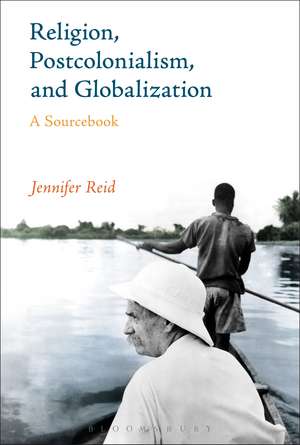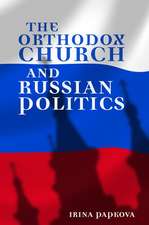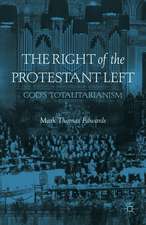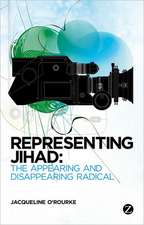Religion, Postcolonialism, and Globalization: A Sourcebook
Autor Jennifer Reiden Limba Engleză Hardback – 17 dec 2014
| Toate formatele și edițiile | Preț | Express |
|---|---|---|
| Paperback (1) | 225.49 lei 6-8 săpt. | |
| Bloomsbury Publishing – 17 dec 2014 | 225.49 lei 6-8 săpt. | |
| Hardback (1) | 774.20 lei 6-8 săpt. | |
| Bloomsbury Publishing – 17 dec 2014 | 774.20 lei 6-8 săpt. |
Preț: 774.20 lei
Preț vechi: 1051.92 lei
-26% Nou
Puncte Express: 1161
Preț estimativ în valută:
148.23€ • 154.36$ • 122.99£
148.23€ • 154.36$ • 122.99£
Carte tipărită la comandă
Livrare economică 13-27 februarie
Preluare comenzi: 021 569.72.76
Specificații
ISBN-13: 9781472586087
ISBN-10: 1472586085
Pagini: 264
Dimensiuni: 156 x 234 x 16 mm
Greutate: 0.54 kg
Editura: Bloomsbury Publishing
Colecția Bloomsbury Academic
Locul publicării:London, United Kingdom
ISBN-10: 1472586085
Pagini: 264
Dimensiuni: 156 x 234 x 16 mm
Greutate: 0.54 kg
Editura: Bloomsbury Publishing
Colecția Bloomsbury Academic
Locul publicării:London, United Kingdom
Caracteristici
Addresses a gap in the market for a textbook which approaches the topics of globalization and post-colonialism from a History of Religions perspective
Notă biografică
Jennifer Reid is Professor of Religion at the University of Maine Farmington, USA. Her research interest is primarily in methodology in the study of religion and she has published extensively on issues relating to the relationship between indigenous and non-indigenous peoples in modernity and late-modernity.
Cuprins
Acknowledgments IntroductionSection I: Contextualizing GlobalizationSection I Part 1(i) Inter Caetera [Papal Bull, 1493] (ii) First Letters Patent Granted by Henry VI to John Cabot (March 5, 1496)(iii) An Act for Continuing in The East India Company, 1813Section I Part 2(iv) Tarak Barkawi 'Military Globalisation is Nothing New'(v) 'The Modern World System' Emmanuel Wallerstein(vi) 'The Protestant Ethic and the Spirit of Capitalism' Max WeberSection II: Religion and Globalization: A Dialogue With Prevailing WisdomSection II Part 1(i) 'The Clash of Civilizations' Samuel P. Huntington(ii) 'Jihad vs. McWorld' Benjamin Barber(iii) 'Ethics Must be Global, Not Local' Bill GeorgeSection II Part 2(iv) 'The Clash of Ignorance' Edward W. Said(v) 'Disjuncture and Difference in the Global Cultural Economy' Arjun Appadurai(vi) 'What Clash of Civilization? Why Religious Identity Isn't Destiny' Amartya Sen(vii) 'Global Religion' David ChidesterSection III: CosmopolitanismSection III Part 1(i) 'Perpetual Peace' Emmanuel KantSection III Part 2(ii) 'The Kantian Project of the Constitutionalization of International Law: Does it Still Have a Chance?' Jürgen Habermas(iii) 'Patriotism and Cosmopolitanism' Martha Nussbaum(iv) 'Cosmopolitan Democracy and the Global Order: A New Agenda' David Held(v) 'The Case for Contamination' Kwame Anthony AppiahSection III Part 3(vi) 'Cosmopolitanism and Nationalism' Craig Calhoun(vii) 'Defining a New Cosmopolitanism: Towards a Dialogue of Asian Civilizations' Ashis Nandy(viii) 'Guru English: South Asian Religion in a Cosmopolitan Language' Srinivas AravamudanSection IV: Before and Beyond the Discourse of GlobalizationSection IV Part 1(i) 'Excerpts from Royal Commentaries of the Incas and General History of Peru' Garcilaso de la Vega(ii) Manifesto of the Second Pan-African Congress, 1921.(iii) 'The Fourth World: Nations Without a State' Bernard O. Nietschmann(iv) United League of Indigenous Nations Treaty, 2007(v) 'Economic Globalization, Indigenous Peoples, and the Role of Indigenous Women' Makere Harawira(vi) 'In Living Memory' Pedro Pérez SarduySection IV Part 2 (vii) 'EarthChild' Kofi Anyidoho (viii) 'My Kind of Exile' Tenzin TsundueReferences
Recenzii
The Religion, Postcolonialism and Globalization sourcebook is an invaluable resource for anyone who wants a better understanding of relationships between religion and the development of the modern world. For teachers this sourcebook clearly directs students attention to the 'Doctrine of Christian Discovery' as the basis of globalization. The consequences of this Doctrine to communities around the world after 1492 gives students a deeper and more profound appreciation of the world that they currently inhabit. It is already a required textbook in my religion and colonialism classes.
Think we've moved beyond multiple colonial contaminations in our globalizing world? Think again! Read Jennifer Reid's invaluable record of how philosophical and vehement religiosity, the long events and tentacles of colonial domination infiltrate our dreams of globalizations and new agendas. Read of the many directions, writers and cultures from which come the justifications for and critical insights against the trauma of frontiers, cosmic cities, hearts and bodies.
This sourcebook edited by Jennifer Reid lays the groundwork for a serious historical and religious discussion of the practical and discursive meanings of globalization. Her narratives and the informative articles move the meaning of globalization beyond the limited economic focus and reveals the wide range of implications evoked by the terms of the title. The sourcebook opens the concepts and practices of all the Human Sciences for radical interrogation and critique. This is an important and needed addition to an important cultural inquiry.
While books about globalization are abundant, one that considers the dynamics of trans-cultural interactions and global relationships of exchange as "a fundamentally religious phenomenon" cuts new ground. In that sense-and others-Jennifer Reid's sourcebook both alerts us of a gap in conventional ways of thinking about the reciprocal if invariably asymmetrical relations among persons and communities from different parts of the world, and then works to fill that gap. Providing a long and wide view of globalization and religion, both of which are broadly but very carefully conceived, the reading selections are ample and strategically made; and the associated commentary on those readings is provocative and well formulated in ways that holds open a range of different conclusions. To be sure, this sourcebook is a very welcome addition to the landscape of both globalization studies and, even more, religious studies.
Jennifer Reid's sourcebook is an important project, worthy of a wide and mixed readership: it is sophisticated in conceptualization; creative in organization and categorizations; and smart and strategic in selection of sources. It provides for the student interested in the construction of the modern world a fascinating window onto the profound and complex representations, functions, and effects of "religion." I recommend this book with enthusiasm, and predict that it will for some time be a focal point in serious discussions about a wide range of topics and issues deemed compelling.
Think we've moved beyond multiple colonial contaminations in our globalizing world? Think again! Read Jennifer Reid's invaluable record of how philosophical and vehement religiosity, the long events and tentacles of colonial domination infiltrate our dreams of globalizations and new agendas. Read of the many directions, writers and cultures from which come the justifications for and critical insights against the trauma of frontiers, cosmic cities, hearts and bodies.
This sourcebook edited by Jennifer Reid lays the groundwork for a serious historical and religious discussion of the practical and discursive meanings of globalization. Her narratives and the informative articles move the meaning of globalization beyond the limited economic focus and reveals the wide range of implications evoked by the terms of the title. The sourcebook opens the concepts and practices of all the Human Sciences for radical interrogation and critique. This is an important and needed addition to an important cultural inquiry.
While books about globalization are abundant, one that considers the dynamics of trans-cultural interactions and global relationships of exchange as "a fundamentally religious phenomenon" cuts new ground. In that sense-and others-Jennifer Reid's sourcebook both alerts us of a gap in conventional ways of thinking about the reciprocal if invariably asymmetrical relations among persons and communities from different parts of the world, and then works to fill that gap. Providing a long and wide view of globalization and religion, both of which are broadly but very carefully conceived, the reading selections are ample and strategically made; and the associated commentary on those readings is provocative and well formulated in ways that holds open a range of different conclusions. To be sure, this sourcebook is a very welcome addition to the landscape of both globalization studies and, even more, religious studies.
Jennifer Reid's sourcebook is an important project, worthy of a wide and mixed readership: it is sophisticated in conceptualization; creative in organization and categorizations; and smart and strategic in selection of sources. It provides for the student interested in the construction of the modern world a fascinating window onto the profound and complex representations, functions, and effects of "religion." I recommend this book with enthusiasm, and predict that it will for some time be a focal point in serious discussions about a wide range of topics and issues deemed compelling.















